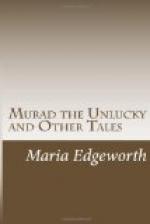“Now, take my word,
Wise men of Hereford,
None in safety may be,
Till the bad man doth flee.”
“You’ll oblige me, sir,” said the verger, “if you would never repeat those verses, sir, nor mention, in any company, the affair of the king of the gipsies.”
“I will oblige you,” replied Mr. Marshal, “if you will oblige me. Will you tell me honestly whether, now that you find this Mr. O’Neill is neither a dog-killer nor a puller-down of bark-ricks, you feel that you could forgive him for being an Irishman, if the mystery, as you call it, of the hole under the cathedral was cleared up?”
“But that is not cleared up, I say, sir,” cried Mr. Hill, striking his walking-stick forcibly upon the ground with both his hands. “As to the matter of his being an Irishman, I have nothing to say to it; I am not saying anything about that, for I know we all are born where it pleases God, and an Irishman may be as good as another. I know that much, Mr. Marshal, and I am not one of those illiberal-minded, ignorant people that cannot abide a man that was not born in England. Ireland is now in his majesty’s dominions. I know very well, Mr. Marshal; and I have no manner of doubt, as I said before, that an Irishman born may be as good, almost, as an Englishman born.”
“I am glad,” said Mr. Marshal, “to hear you speak—almost as reasonably as an Englishman born and every man ought to speak; and I am convinced that you have too much English hospitality to persecute an inoffensive stranger, who comes amongst us trusting to our justice and good nature.”
“I would not persecute a stranger, God forbid!” replied the verger, “if he was, as you say, inoffensive.”
“And if he was not only inoffensive, but ready to do every service in his power to those who are in want of his assistance, we should not return evil for good, should we?”
“That would be uncharitable, to be sure; and, moreover, a scandal,” said the verger.
“Then,” said Mr. Marshal, “will you walk with me as far as the Widow Smith’s, the poor woman whose house was burnt last winter? This haymaker, who lodged near her, can show us the way to her present abode.”
During his examination of Paddy M’Cormack, who would tell his whole history, as he called it, out of the face, Mr. Marshal heard several instances of the humanity and goodness of O’Neill, which Paddy related to excuse himself for that warmth of attachment to his cause that had been manifested so injudiciously by pulling down the rick of bark in revenge for the rest. Amongst other things, Paddy mentioned his countryman’s goodness to the Widow Smith. Mr. Marshal was determined, therefore, to see whether he had, in this instance, spoken the truth; and he took Hill with him, in hopes of being able to show him the favourable side of O’Neill’s character.
Things turned out just as Mr. Marshal expected. The poor widow and her family, in the most simple and affecting manner, described the distress from which they had been relieved by the good gentleman; and lady—the lady was Phoebe Hill; and the praises that were bestowed upon Phoebe were delightful to her father’s ear, whose angry passions had now all subsided.




